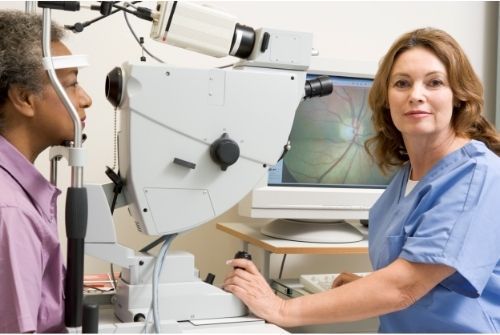The Real Reason You Should Schedule a Dilated Eye Exam
Eye exams are just as important as visiting your doctor or dentist. Unfortunately, many people don’t realize that eye exams are about more than updating your eyewear prescription. Dilated eye exams provide eye doctors with a deeper understanding of your vision health, overall health, and steps that need to be taken to protect you.

Dilated eye exams shine a light on a variety of vision and other health-related issues. Cataracts, glaucoma, and macular degeneration can all lead to significant vision loss if not checked regularly. Dilated eye exams also pick up on other health problems such as hypertension, diabetes, and autoimmune disorders that can affect your overall health.
Why You Need a Dilated Eye Exam
Dilated eye exams provide our surgeons with a more in-depth look at your visual health. More importantly, they also give your ophthalmologist a look at your overall health. This makes them an essential part of your preventative health routine, and just as important as your annual physical and regular dental checkups.
Many vision and other health problems don’t show signs or symptoms in their early stages. Additionally, a lot of vision problems are the most treatable in their early stages, but you need to take the proper steps to ensure that eye conditions are caught in order to receive treatment. Doing so will not only protect your vision, but other aspects of your health as well.
With a dilated eye exam, your ophthalmologist can detect early signs of:
- Cataracts
- Glaucoma
- Macular degeneration
- Hypertension
- Diabetes
- Autoimmune disorders
If you’re diagnosed with any of these conditions, our team can work with you to develop a treatment plan. This will help you receive the treatment you need to preserve your vision, and allows our team to track any changes that may occur. For signs that it’s time to schedule your next comprehensive eye exam, check out our recent blog.
Cataracts
Cataracts are the clouding of the crystalline lens in the eye. Located behind the pupil, your lens works with the cornea to focus light on the retina to create the images that you see. Cataracts are often described as a glare of filminess over the eye that causes vision to become dim or blurred.
Cataracts can take a long time to develop to this stage and can go unnoticed for years. With regular comprehensive eye exams (which include a dilated eye exam), our team of ophthalmologists can spot them early and provide the treatment you need. To learn more about our treatment for cataracts, click here.
Glaucoma
Glaucoma occurs when the optic nerve is damaged, usually due to high eye pressure. The optic nerve is what connects your eyeball to your brain, so it becoming damaged can cause severe vision loss if left untreated.
According to the BrightFocus Foundation , over three million Americans over the age of 40 have some form of glaucoma. This makes it the leading cause of irreversible blindness in the United States as well as the world. Dilated eye exams are key to catching it and preventing its spread. For more information about glaucoma treatment at Baptist Eye Surgeons, click here.
Macular Degeneration
Macular degeneration is the loss of central vision. This can make it difficult to see objects directly in front of you with them seeming blurred rather than clear. Macular degeneration is often associated with getting older, but it can also be the result of genetics. It’s not curable, but it can be treated and slowed down in certain cases. Dilated eye exams are essential for catching it early so you can receive treatment immediately.
Hypertension
It can take years for symptoms of hypertension to manifest in your eyes, but they’re a clear sign to your eye doctor that something is wrong. Dilated eye exams act as a first line of defense against the “silent killer” of high blood pressure. They help you get the nutrition, exercise, and medication you need to avoid a heart attack and protect your vision.
Diabetes
High blood sugar damages your blood vessels including those in your eyes. It can cause diabetic retinopathy , which damages the blood vessels in your eyes and causes vision loss. Dilated eye exams catch microaneurysms early and prevent long-term damage to your retina. Click here to learn more about how we diagnose and treat diabetes-related eye conditions.
Autoimmune Disorders
Dilated eye exams can pick up on a variety of autoimmune disorders that may go undiagnosed. Autoimmune disorders can affect your eyes in different ways, but many of them have the same underlying symptoms — swelling and inflammation. Eye dilation allows our surgeons to see deep within the eye to detect these symptoms and get you the treatment you need.
What happens during a dilated eye exam?
Eye exams check a variety of factors related to your vision. This includes visual acuity, eye movement, depth perception, and many others. What makes dilated eye exams unique is that they “open up” your eyes to let more light in than normal. This allows our surgeons to get a clearer picture of your eye health and spot any problems that may be developing.
Dilated eye exams are essential for your vision and overall health. They give our eye surgeons a deeper picture of what’s happening in your eye and help them to spot issues such as cataracts, glaucoma, and macular degeneration. They can also help you get the treatment you need if you have hypertension, diabetes, autoimmune disorders, and much more.
Are you concerned about vision issues that may be going undetected? Contact us today to schedule your dilated eye exam!
Baptist Eye Surgeons is an ophthalmological practice in Knoxville, TN, and Morristown, TN. Give us a call at 865-579-3920 for more information or to schedule an appointment.


MORRISTOWN
SEVIERVILLE
TENNESSEE VALLEY - LASER CENTER
TENNESSEE VALLEY - EYE CENTER



